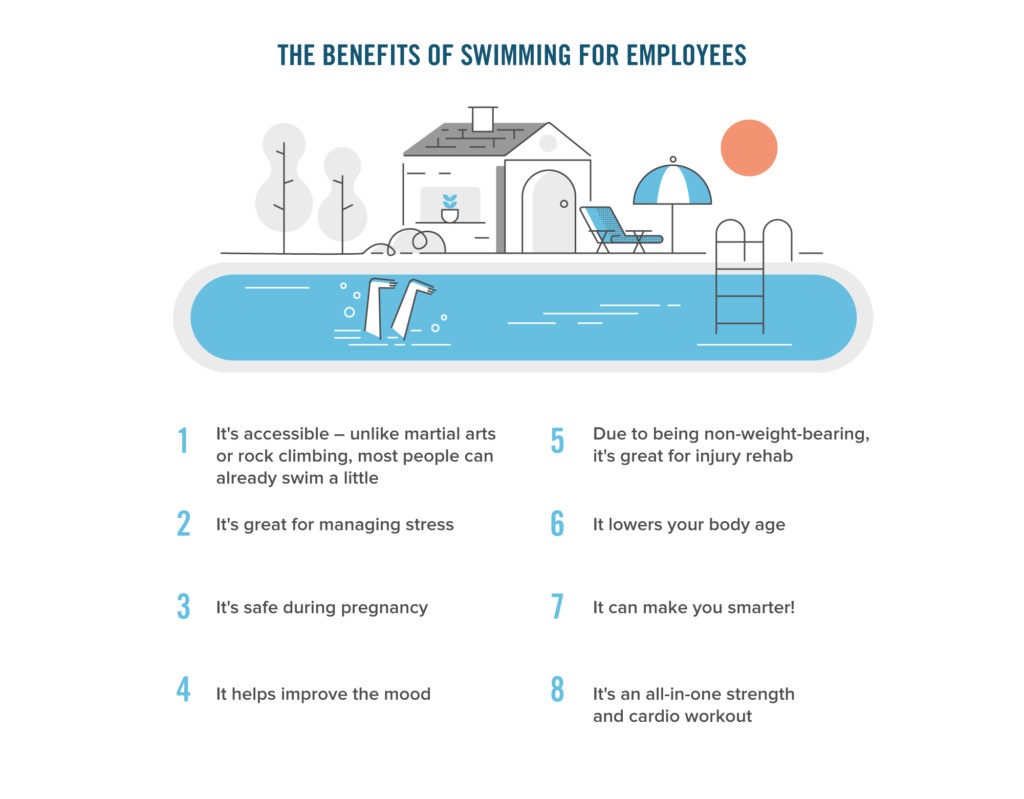Any corporate health and wellness program is a reason to celebrate. Everything from table tennis to rock climbing to yoga will have positive effects on employee happiness and improve the company culture. But one particular activity deserves special recognition thanks to the sheer amount of good it can do. Swimming, as we’ll see, is so good for most people, it’s a wonder we’re ever on dry land.
In this post, we’ll see nine excellent reasons to make swimming easily available to your team. Whether it’s for special team building trips or as part of your regular health program, your team needs to hit the pool from time to time.
Let’s get into it.
1. It’s suitable for most employees
Workplace exercise programs can feel exclusive to some staff. They may be injured, have chronic pain, or simply not enjoy working out with their colleagues.
While this may still be the case, swimming is very accessible to most people. It works for older and younger staff, is great for injuries and pain (as we’ll see), and employees can enjoy it however they prefer. That’s not really the case for team sports, which can easily become too competitive.
Plus you can make swimming accessible to staff on their own or in groups. If they want to go with colleagues and enjoy time together, of course they can. But if a team member wants to swim two kilometres solo before work or at lunch, that’s also a possibility.
The goal for your corporate health and wellness program should be inclusion – the more people on the plan, the bigger the benefits for the company. And swimming ticks this box in a major way.
2. It’s ideal to manage stress
Your employees live hectic, complicated lives. And unfortunately, work can be a major contributor to this problem. It’s in your best interest, then, to try to help employees manage their stress levels. The calmer and more focused they are, the more productive they’ll be.

And that’s where the pool can absolutely help*¹ them. Swimming stretches your body constantly. Combine this with the deep rhythmic breathing, and you can experience a relaxation rush that’s very unique to the sport. Swimming is also calming and meditative, as the sound of your breathing and the water rushing by helps you focus inward and drown out all other distractions. This lowers stress and depression naturally.
Swimming even has long-term benefits*² related to stress: “Research also shows that swimming can reverse damage to the brain from stress through a process called hippocampal neurogenesis. So, if you feel like you’re drowning emotionally, jumping in an actual body of water may be exactly what you need to find your feel-good feet again.”
Some of these effects are the case no matter what kind of exercise you do. Sport forces you to think about things other than work, and that little break can be just what you need.
But there’s something extra-special about swimming for stress relief*³: “While exercise-induced endorphins will do wonders for your stress levels, getting in the water for your workout may have its own special brand of mood-boosting benefits. Being submerged in water dulls the amount of sensory information that bombards your body, helping to bring on feelings of calm, according to a study published in Pain Research & Management. Researchers found that regular flotation tank sessions were effective at relieving symptoms in patients suffering from conditions related to chronic stress.”
3. It’s safe during pregnancy
We should make something very clear to begin this section: executives and management should not tell women how to conduct themselves during pregnancy. Bad idea.
But companies can support pregnant employees by giving access to exercise options that suit them. If the only options you provide are weight lifting and team sports, you’re going to leave people out. In the United Kingdom, the NHS specifically recommends swimming*⁴ for expectant mothers because of its low impact on the body. Women can still enjoy an excellent workout, while the water supports any extra weight.
By keeping opportunities open, and including swimming, yoga, stretching, and other lower-impact activities, you naturally make the workplace a little bit easier for pregnant staff.
4. It has been shown to improve mood
One study*⁵ showed that regular swimming significantly improves the moods of people struggling with dementia. While that’s unlikely to be your employees, it suggests that good results are also likely among people who aren’t dealing with the condition.
Exercise in general certainly makes people happier. Physical activity releases endorphins*⁶, which give an almost instant positive feeling. These happy hormones lead to better self esteem*⁷, reduce pain, and even leave some people feeling euphoric. And because swimming is such an accessible form of exercise, it’s going to mean better moods for more people around the office – not just the Energizer bunnies.
5. It’s great for injury rehab
Another reason that your employees might shy away from physical activity is nagging or chronic injuries. It might be obvious – they’re walking with crutches, for example. And there will be countless injuries among your team that you have no idea about – knees that don’t work properly, shoulder reconstructions, and even poor heart health.
But swimming is one of the best ways to rehabilitate injuries*⁸. It’s low-impact, doesn’t need to be intense, and there are lots of strokes to choose from.
Swimming is such a good option because it lets people rehabilitate in a way that your indoor football league or running club simply can’t. You can support employees in their recovery where other activities would normally exclude them.
6. It makes your team younger
That may seem like a typo. Swimming can’t actually reverse the aging process, surely. But studies suggest*⁹ that perhaps it can indeed. “Regular swimmers are biologically 20 years younger than their driver’s licenses say they are, according to research from Indiana University.” Which is completely astonishing.

And that’s not all. If we want to be a little more dramatic, it’s been shown that swimmers live longer*¹⁰: “South Carolina researchers followed 40,547 adults ages 20 to 90 for more than 3 decades and discovered that swimmers – regardless of age – were about 50% less likely to die during the study than were sofa sitters, walkers, and runners.”
We’re serious about the idea that healthy habits make healthy workers. And no matter which physical activities you prefer, it’s most important that you’re simply doing some activity. But it’s pretty clear from this research that swimming is one of the absolute best choices to keep your team healthy.
7. It makes you smarter
You’ve already got a squad of sharp, intelligent minds working to improve your products and services. And as unlikely as it may seem, swimming could actually help take them to a whole new level*¹¹: “Blood flow to the brain increased by up to 14% when men submerged themselves in water up to their hearts, according to a Journal of Physiology study. Researchers believe water’s pressure on the chest cavity may have something to do with it.”
And that’s not the only study. Research from Australia*¹² “showed that kids who regularly participated in swimming were able to master language development, fine motor skills, confidence, and physical development sooner than the control group.”
We’re not suggesting that you start throwing employees into the pool in order to make them smarter. But encouraging your team to swim regularly may have significant benefits for mental functions, not just physical.
8. It’s great for busy people
Swimming is part-cardio, part-strength training. It builds muscle, tones the body, increases endurance, and raises your heart rate. All in one.
Which is ideal for busy people. Let’s face it, nobody has as much free time as they’d like. You should be emphasizing work-life balance and getting your team members away from their desks. But if there’s a high-quality workout that can be done in 45 minutes to an hour, that’s perfect!
And it doesn’t even have to take that long. Because swimming requires constant effort, 30 minutes in the pool*¹³ is the equivalent of 45 minutes on land.
9. It’s great for kids

You probably don’t spend a lot of time worrying about children in the office. But your staff with children certainly do. Kids love swimming, and it’s an important skill for them to learn. Anything you can do to support this is going to appeal highly to your valuable staff.
We’re not suggesting you pay for children to go swimming. Just give swimming access to staff as part of your health and wellness program. They can enjoy a trip to the pool with their children with a hefty discount, knowing that the company made it possible.
Plus, it’s a great way for several staff to bring their kids together outside of work hours. This builds a real community around the company, and builds a corporate culture that supports and welcomes families.
A varied sport and health program is key
Those were nine great reasons why you should help your team to swim regularly. But don’t rush out and build an Olympic pool in the basement. There’s a better way to approach things.
The best corporate health programs give staff the maximum amount of flexibility. Yes, swimming is great for most people – but not everyone. And while some may be keen for a regular dip, others want to keep up the sports and fitness regimes they already enjoy.
To achieve this, you need a company wellness plan that keeps all options open. As long as you can get people enjoying a little physical activity, that’s what counts. And maybe throw them in the pool from time to time, too.
WOULD YOU LIKE TO KNOW MORE ABOUT OUR CORPORATE FITNESS OFFERS?
[contact-form-7 id=”2197″ title=”Contact form”]

References:
*¹ https://www.lifehack.org/articles/lifestyle/ten-benefits-swimming-you-may-not-know-about.html
*² https://www.lifehack.org/articles/lifestyle/ten-benefits-swimming-you-may-not-know-about.html
*³ https://www.fitnessmagazine.com/workout/swimming/benefits-of-swimming/
*⁴ https://www.nhs.uk/conditions/pregnancy-and-baby/pregnancy-exercise/
*⁵ https://www.ncbi.nlm.nih.gov/pubmed/24521103
*⁶ https://www.fitnesseducation.edu.au/blog/health/how-exercise-makes-you-happy/
*⁷ https://www.webmd.com/depression/guide/exercise-depression#1
*⁸ https://share.upmc.com/2016/08/swimming-rehabilitation/
*⁹ https://www.fitnessmagazine.com/workout/swimming/benefits-of-swimming/
*¹⁰ https://www.prevention.com/fitness/fitness-tips/a20447836/swim-for-a-longer-life/
*¹¹ https://www.fitnessmagazine.com/workout/swimming/benefits-of-swimming/
*¹² https://www.lifehack.org/articles/lifestyle/ten-benefits-swimming-you-may-not-know-about.html
*¹³ https://www.swimming.org/justswim/8-benefits-of-swimming/

